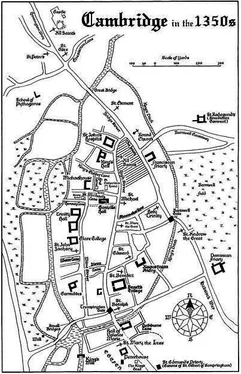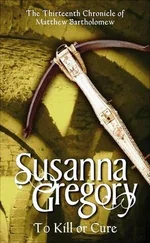‘Do you think Ailred did something to bring about Turke’s death?’ he asked.
‘Possibly,’ said Michael. ‘There are too many connections between them to be ignored. So, Turke murdered Fiscurtune, then bribed the local Sheriff to ignore the crime. Fiscurtune’s family must have been outraged. Then Turke embarked on a pilgrimage to “atone” for his sin, making it clear he was doing so only because he intended to be elected Lord Mayor and did not want an inconvenient matter like murder to stand in his way.’
‘It would have added insult to injury,’ agreed Bartholomew. ‘And then this pilgrimage took him through Cambridge, where one of the wronged kinsmen lives. When the snows isolated the town and trapped Turke here, it must have seemed as though fate was screaming for vengeance.’
‘God was screaming for vengeance,’ corrected Michael. ‘Ailred is a friar, remember? What did he do, do you think? Force Turke on to the ice somehow?’
‘There were no obvious injuries on Turke’s body, so I do not think violence was used.’
‘Ailred could have threatened him with a crossbow,’ suggested Michael.
‘In broad daylight on the Mill Pool? Someone would have seen them.’ Bartholomew rubbed a hand through his hair, and asked the question that had been gnawing at the back of his mind ever since he had first learned about the possible connection between Ailred and Turke. ‘Do you think Philippa suspects her husband’s death was not an accident, and she knows or has guessed that Ailred is involved?’
‘I do not see how, unless she was there.’ Michael studied his friend with sombre green eyes. ‘And I do not think she was there, despite the fact that we know Giles regularly locked himself in her room, leaving her free to wander.’
‘Then why do I feel as though she is not telling us the truth? Even Matilde can see there is something strange about Philippa, and they do not even know each other.’
Michael patted his arm. ‘Eat your parsnips, Matt. Then we shall search again for the elusive Ailred. He cannot be far – the roads are still closed, and he has nowhere else to go.’
Bartholomew and Michael left the Brazen George, and were about to turn down St Michael’s Lane when they encountered Langelee striding towards them, gripping Quenhyth by the scruff of his neck. Langelee’s face was impassive, but the student’s expression revealed exactly how he felt: angry, maligned and humiliated. He was trying to explain something to Langelee, but Langelee was refusing to listen.
‘I was on my way to your prison,’ Langelee said, thrusting Quenhyth at Michael, so hard that the lad bounced into Michael’s substantial girth and almost lost his balance. ‘I want you to take charge of this miserable specimen.’
‘What has he done this time?’ asked Michael, fixing the hapless student with a stern eye. ‘Another whore in his bed? Or has he hidden Father William’s crutches again?’
Quenhyth bristled. ‘I did neither of those things, and you know it. They were pranks designed specifically to land me in trouble.’
‘I caught him searching the servants’ belongings,’ said Langelee to Michael with considerable anger. ‘The steward came to me in a panic, saying there was a burglar in the stable loft, and when I investigated I found Quenhyth. I cannot imagine what he was thinking of.’
‘I was not among the servants ’ possessions,’ said Quenhyth. ‘I was looking through baggage belonging to the Chepe Waits. Brother Michael himself gave me permission to search them, so I could prove they stole my scrip. I would have gone sooner, but I had to wait until they were out.’
‘Your obsession with the Waits verges on the fanatical,’ said Michael, shaking his head. ‘Such an attitude will land you in hot water one day.’
‘It has landed him in hot water today,’ said Langelee sternly. ‘I cannot condone students rifling through our servants’ belongings. They will leave us, and then where will we be? Good retainers do not grow on trees, unlike bothersome students.’
‘I was only doing what you told me to do,’ cried Quenhyth, appealing to Michael. ‘And I discovered something important, so it was worth my efforts.’
‘You found your scrip?’ asked Bartholomew.
‘Something much more important than that,’ said Quenhyth, a note of triumph entering his voice when he saw he had Michael’s attention. ‘I can prove the Waits knew Dympna – the woman who sent notes to Norbert and lured him to his death.’
Michael raised his eyebrows. ‘And how can you do that?’
‘Because I have a message written by her,’ said Quenhyth smugly. He produced a piece of parchment with a flourish. ‘I decided to take it, because Frith would have rid himself of it by the time I had alerted you. The message was in plain view, between two floorboards.’
Michael snatched the note from him, read it quickly, then handed it to Bartholomew. It contained nothing other than the name Dympna and a series of numbers, just like the ones they had seen on the parchment in Gosslinge’s throat. These were one, thirteen and four, and the ink was pale enough to be all but invisible. The message still made no sense to the physician, although Quenhyth was right in that it indicated an association between the Waits and the benevolent moneylenders. Or perhaps they had gained possession of one of the messages sent to Norbert.
‘Being between the floorboards is not in plain view,’ said Bartholomew, passing it to Langelee.
‘It was in plain view to anyone conducting a thorough and meticulous search,’ said Quenhyth pedantically. ‘Well, what do you think? It is damning evidence, is it not?’
Michael took Bartholomew’s arm and pulled him away, so they could speak without being overheard by Quenhyth. Langelee followed, raising an imperious finger at the student to tell him to stay where he was.
‘It is possible that the Waits applied for a loan from Dympna, and this message is Dympna’s response,’ said Michael. ‘It is obviously in some kind of code.’
‘The one we found inside Gosslinge was written with onion ink or some such thing,’ said Bartholomew. ‘It only became visible when warmed. I wonder why this is not the same.’
‘I was once fooled by that, too,’ said Langelee, who knew a lot about codes and secret messages from his days as a spy for the Archbishop of York. ‘I believed a message had been written invisibly, but it transpired some cheap inks just fade with extremes of temperature – as this has started to do. The recent weather has been very cold.’
‘So Gosslinge’s note was not written in secret ink?’ asked Michael, shooting Bartholomew a look that indicated he felt the physician had misled him.
‘Probably not,’ said Langelee. ‘Why write invisibly, if the message is meaningful only to the recipient? However, remember also that codes are only good if the recipient knows what they mean, otherwise there is no point in using them.’
Bartholomew took the parchment, and thought about Langelee’s words: something that would be understood by each recipient. The fact that these possibly included Norbert, Gosslinge and the Waits meant it had to be something very simple. Suddenly, the whole thing was crystal clear.
‘Of course!’ he exclaimed. ‘I understand! One, thirteen and four.’
‘I can see that,’ snapped Michael testily. ‘The question is, what does it mean?’
‘There are three numbers here, just as there were three on the note we discovered in Gosslinge. And those numbers represent pounds, shillings and pence.’
‘Can it really be as basic as that?’ asked Michael, inspecting the parchment with renewed interest. ‘Someone makes an application, and Dympna responds by sending a note specifying the amount it is prepared to advance?’
Читать дальше












